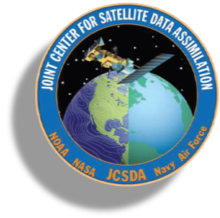On Thursday, January 25, the JCSDA core team and partners from NOAA, NASA, U.S. Navy and Air Force, and the UK Met Office met virtually and in-person to review accomplishments from the last three months and discuss future goals. This quarter saw a lot of functionality added to SkyLab with the release of SkyLab v7, two spack-stack releases, numerous additional sensors, and much more!
The Obs team started the morning off, with quarterly accomplishments including:
atm cycled hybrid 4DEnVar with FV3 deterministic in SkyLab v7
IODA converter update (TEMPO converter, balloonsonde decoder)
In SkyLab v7, CRTM v3.1 implemented as operator for radiances
Passive/active sensors all validated by NASA in-kinds
Intercomparison of GNSSRO QC methods in NWP through the EUMETSAT ROM-SAF visiting scientist project; Dr. Hailing Zhang from the obs team visited the UK Met Office to work on this research, and is planning a subsequent visit during which time the final report will be compiled
CRTM followed Obs, and this quarter they:
Added support for active radar
Changed from ecbuild to supporting cmake
Moved towards JCSDA partners having access to their own aerosol models as well as community access
Collaborated closely with STAR, especially on coefficient generation
Next up was SOCA, with some exciting new capabilities:
Explicit diffusion for SOCA is now 3D
Added small scale correlation operator for explicit diffusion
Enabled ATLAS mesh connectivity
Added IR to R2D2 (Hamideh Ebrahimi’s work)
Moving towards coupled OASIM H(x) in SkyLab
NOAA EMC adopted 3D explicit diffusion correlation operator
Atmospheric COMPOsition came in with some exciting new capabilities and accomplishments:
Added several new COMPO obs in SkyLab v7, including, AMSU_A (NOAA 15,18,19 and MetOP B,C), VIIRS (NPP and NOAA 20), and MODIS (Aqua and Terra)
TEMPO preliminary data demonstration in SkyLab comparing TEMPO and TROPOMI accomplished this quarter
Moving towards 4DHTLMVar and 4DEnVar with Skylab Trace gas
JEDI is now capable of performing 4DEnVar and 4DVar with HTLM for aerosols, with the first demonstration showing that the algorithm works as intended.
The Algorithms team came in strong, with highlights including:
Atlas model interface standardization
Hybrid TLM in SkyLab v7
Forecast score comparison in SkyLab
4DEnVar with high-resolution UFS and MPAS in SkyLab
The team ran a “demo” full cycling UFS experiment with 4D-En-Var high res, and 3D-Var 80 member ensemble
A multi-resolution and residual formulation of a multi-resolution HTLM was implemented in OOPS by Tom Hill from the UK Met Office while visiting JCSDA.
The team ran a MPAS high-resolution, 4D-En-Var experiment via Skylab, comparable to high-res GFS Skylab experiments
Finishing up the review was the Infrastructure team, with great progress in development and implementation:
Released spack-stack 1.5.1 and 1.6 in partnership with NOAA EMC and EPIC, which support UFS applications, NASA’s SWELL environment, cycl-8, and JEDI with FV3, UFS, MPAS, UM, and NEPTUNE
Fully implemented and tested the IODA Parallel reader for the SkyLab-atm-land experiment
Made R&D cluster GNU software stack available for JEDI-Skylab
Ported JEDI-Skylab to Hercules and Derecho for EWOK and migrated ROMEX from dedicated server to R&D cluster
Completed roll-out of new CI system to all jedi-bundle repositories
Rolled out Terraform unified settings and branch protection rules to 25 repositories on Github, up from 4 repositories for the initial demonstration in the previous quarter
Congratulations to the entire JCSDA staff and all of our partners and in-kinds for these big steps forward! Keep an eye out for upcoming developments with a lightning obs operator, coupled H(x) in SkyLab for SSt IR/MW radiance, further Hybrid TLM development, and much more.
If you have any questions or would like further information, you can visit us at https://jcsda.org/ or reach the team at jcsda-info@ucar.edu.
You can see all of the presentations from JCSDA’s Q3 Review here.
Photo by Andrey Zaychuk on Unsplash

